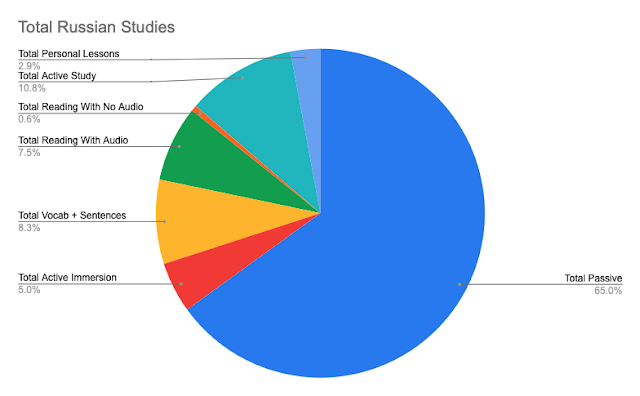Acquiring Russian: November Report
November Statistics
November was another lockdown month here in London which meant I was able to spend more time on my Russian acquisition mission. As I mentioned in previous posts I reassessed how I was spending my time half way through the month.
I stopped using the Fluent Forever Pronunciation Trainer because I had reached the point of diminishing returns and I refocused my attention on increasing my passive vocabulary. Although I said I would spend more time on Fluent Forever's The Most Awesome Word List You Have Ever Seen, that didn't end up happening.
Instead I spent roughly 10 minutes a day on Xefjord's 200 words and phrases and 10 minutes on a frequency deck of the 1000 most used Russian words. Out of Xefjord's deck 60% of the cards are now labeled Young and 40% mature (I suspended all English -> Russian cards), my revision time for this deck is now down to 5 minutes.
So now I've increased the number of new cards for the frequency deck from 7 to 10 and will monitor how long it takes me to do the daily revision. I will aim for 20 to 30 minutes per day but will see how much I can tolerate. At the current pace it looks like it will take me another three months to get through all 1000 words but ideally I'll do it in two. Many of the words covered in those two decks will probably appear in the list of 625 but I would still like to work my way through the book.
For passive immersion I am still listening to Dungeons & Dragons' streams and according to Matt's new comprehension model I'm experiencing a comprehension level that varies between 1 and 2. This means that I recognise various words, sometimes understand little snippets of sentences and occasionally have a vague sense of what's being spoken about. The conversation in these streams is sometimes very fast and I'll recognise various words as they fly by without understanding what's really being said.
My thoughts when listening go something like this "I'm hearing words I don't know. Oh, Ir recognise that word but can't remember what it means, that word as well, and that one, maybe I would know if I thought about it, ok I don't understand anything now. Oh he said 'big and green', she said 'over there', now they are rolling dice and counting up the results, 7 + 7 = 14 and it's a positive result."
Sometimes the players do speak slowly and then I'm more likely to understand the meaning of what is being said in real time. But it will just be little snippets without much grammatical context, something like "I, how many large trees, green, there, walk". So I understand that there's something going on involving trees, but that's about it.
From what Matt has written it's to be expected that initially I'll just be recognising words from my Anki deck studies rather than always immediately remember their meaning in English. As I've said before, if I repeatedly hear a word for which I don't know or can't remember the meaning, then I will look it up with the Google Translate app. Matt advocates scripted content, specifically TV shows that present every day life, as the ideal immersion content. However D&D streams are incredibly dense with few pauses and easy for me to listen to while working. The downside is the speed of the conversations as I mentioned earlier, and not having visual cues to help my understanding.
An example of scripted content is the Night Swallows TV show, but I haven't watched it for a while. It's not that it's not an interesting show it's just that in my regular life I very rarely watch TV shows at all. I prefer documentaries or content that I can learn from. So it's a good thing that Comprehensible Russian: Zero Beginners videos are becoming more interesting as my vocabulary increases. I now understand many of the words spoken in the videos that I've watched 4 or 5 times.
I think it's important to remember that while there may be an ideal type of content for you to watch when learning a language, it is constrained by what is actually available to you and what you enjoy. For example the people studying Japanese might not have as much tailor made comprehensible input available to them, but they will be extremely motivated to watch lots of Anime. I'm lucky that I have a lot of comprehensible input available covering everyday topics and that I can look forward to comprehensible content about social, cultural and historical topics on Inna's Patreon. Perhaps in the future I will try watching the show кухня on 3ears.com as the site makes it very easy to gather words and sentences for studying.
I did a little bit of extra reading with audio right at the start of the month, but did not stick with it. It should be noted however that I'm reading along with audio when I review my Anki decks.
Finally, I still haven't studied Russian grammar. I might start reading through the New Penguin Russian Course book which I bought years ago when I first tried learning the language. I never made it past the first chapter!
That's it for my November report. I'm very interested to hear about your experiences in learning or acquiring Russian with similar methods, and if you have any questions, let me know.
You can find my study log here: Google Doc: Russian Study Log
November
October


Comments
Post a Comment